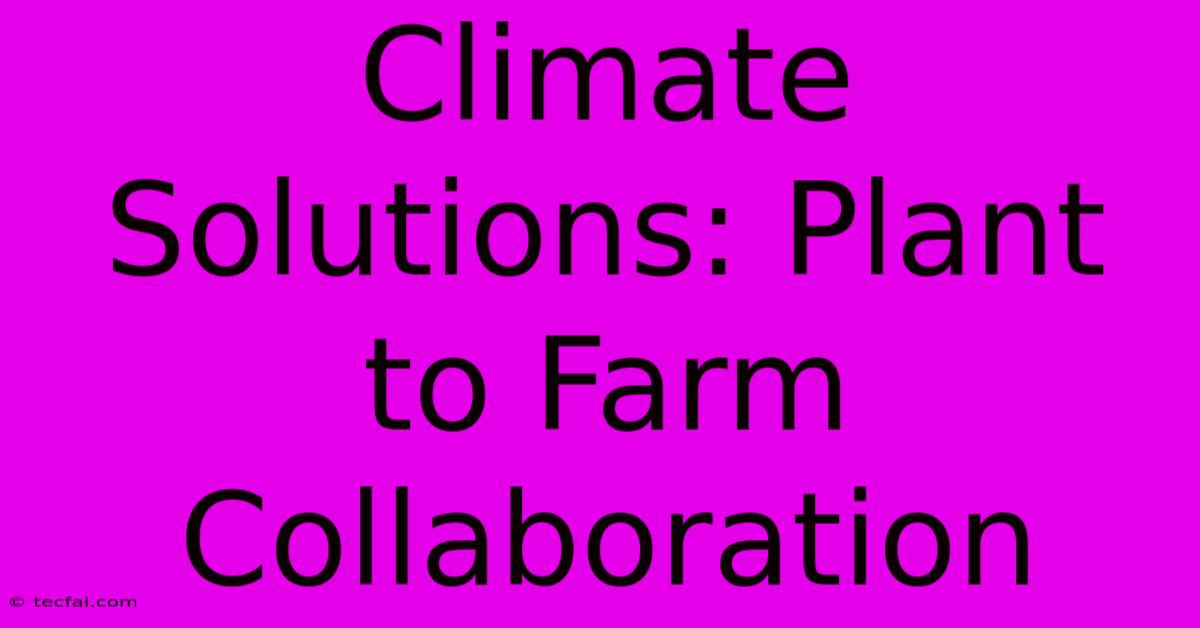Climate Solutions: Plant To Farm Collaboration

Discover more detailed and exciting information on our website. Click the link below to start your adventure: Visit Best Website tecfai.com. Don't miss out!
Table of Contents
Climate Solutions: Plant to Farm Collaboration
Climate change is arguably the most significant challenge facing humanity today. Its effects are far-reaching, impacting everything from agriculture and food security to global economies and human health. While the problem is complex, solutions are emerging, and one particularly promising area lies in the collaboration between plant scientists and farmers. This synergy harnesses the power of cutting-edge research and on-the-ground experience to create truly impactful, sustainable climate solutions.
The Crucial Role of Plant Science in Climate Mitigation
Plant scientists play a pivotal role in developing climate-resilient crops. This involves several key strategies:
1. Developing Drought-Tolerant Crops:
Water scarcity is exacerbated by climate change. Researchers are actively developing crops with enhanced drought tolerance, allowing farmers to maintain yields even in arid conditions. This involves genetic modification, marker-assisted selection, and other advanced breeding techniques. These innovations are crucial for regions already facing water stress and will become increasingly important as climate change progresses.
2. Breeding for Enhanced Nutrient Use Efficiency:
Excessive fertilizer use contributes significantly to greenhouse gas emissions. Plant scientists are working to develop crops that require less fertilizer while maintaining high yields. This reduces environmental impact and lowers production costs for farmers. Improved nutrient uptake efficiency is a critical element in sustainable agriculture.
3. Enhancing Carbon Sequestration:
Plants naturally absorb carbon dioxide from the atmosphere. Research focuses on enhancing this capacity through improved crop management practices and the development of plants with greater carbon sequestration potential. This "carbon farming" approach offers a powerful tool in climate change mitigation.
4. Disease and Pest Resistance:
Climate change alters pest and disease dynamics, increasing crop vulnerability. Plant scientists are developing resilient varieties that can withstand these challenges, minimizing the need for pesticides and reducing crop losses. This reduces the reliance on environmentally damaging chemical interventions.
The Farmer's Perspective: On-the-Ground Implementation
While plant scientists provide the scientific breakthroughs, farmers are the crucial link in translating these innovations into real-world impact. Their invaluable on-the-ground experience and practical knowledge are essential for successful adoption of new technologies and practices.
1. On-Farm Trials and Feedback:
Farmers are vital partners in testing new crop varieties under real-world conditions. Their feedback is crucial for refining breeding programs and ensuring that new technologies are suitable for diverse farming systems.
2. Adaptive Management Strategies:
Farmers adapt their practices to changing environmental conditions. Their expertise in managing local resources and responding to unforeseen challenges is invaluable in implementing climate-smart agriculture.
3. Knowledge Dissemination:
Farmers act as crucial disseminators of information, sharing their experiences and knowledge with other farmers, promoting the widespread adoption of climate-resilient technologies.
Fostering Collaboration: A Path Forward
Effective collaboration between plant scientists and farmers requires a strong, mutually beneficial partnership. This includes:
- Open Communication Channels: Regular dialogue and information exchange are critical.
- Shared Research Goals: Jointly defined research objectives that address both scientific and practical needs.
- Access to Resources: Ensuring both scientists and farmers have access to necessary resources, including funding, training, and technology.
- Incentive Programs: Implementing policies that reward farmers for adopting climate-smart practices.
By fostering strong collaboration between plant scientists and farmers, we can accelerate the development and implementation of climate-resilient agricultural practices. This synergistic approach offers a powerful pathway toward a more sustainable and food-secure future, mitigating the impacts of climate change and building resilience for generations to come. The future of agriculture, and indeed the planet, depends on this crucial partnership.

Thank you for visiting our website wich cover about Climate Solutions: Plant To Farm Collaboration. We hope the information provided has been useful to you. Feel free to contact us if you have any questions or need further assistance. See you next time and dont miss to bookmark.
Featured Posts
-
Delayed Product Impacts Wise Tech Profits
Nov 22, 2024
-
Court Rejects Smollett Charges
Nov 22, 2024
-
John Dignity And Robustness
Nov 22, 2024
-
Womens Cl Arsenal Juventus Live Stream
Nov 22, 2024
-
Adanis Us Legal Trouble Impacts Kenya
Nov 22, 2024
